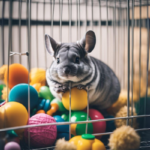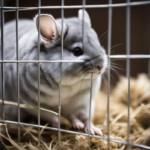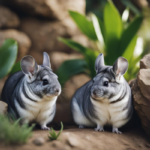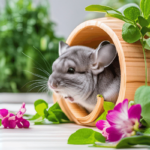When you share your life with a charming chinchilla, it’s essential to understand their unique needs and requirements. Whether you’re a seasoned chinchilla owner or a prospective one, the prospect of pregnancy can be both exciting and daunting.

To ensure the well-being of your furry friend and prepare for any potential additions to your chinchilla family, it’s crucial to know how to tell if a chinchilla is pregnant. In this comprehensive guide, we will delve into the signs and symptoms, care, and other essential aspects of chinchilla pregnancy.
Understanding the Life of a Chinchilla
Before we dive into the intricacies of chinchilla pregnancies, let’s take a moment to understand the lives of these charming creatures. Chinchillas are small, nocturnal rodents native to the Andes Mountains in South America.
They are known for their incredibly soft and dense fur, which has made them a sought-after pet for many. These adorable creatures have a lifespan of around 15 years when well cared for, making them a long-term commitment for their owners.
How to Tell If a Chinchilla Is Pregnant

Chinchilla pregnancies last approximately 111 days (3.5 months), so it’s crucial to be vigilant about your chinchilla’s well-being during this period. Here are the primary ways to determine if your chinchilla is pregnant:
Change in Appetite:
Is your chinchilla suddenly more or less interested in food? An altered appetite is a common indicator of pregnancy.
A pregnant chinchilla may experience fluctuations in her eating habits. Some become more voracious, while others may lose their appetite temporarily. Monitor your chinchilla’s food consumption and note any significant changes.
Weight Gain:
Have you noticed a gradual increase in your chinchilla’s weight? This is one of the most reliable signs of pregnancy.
Pregnant chinchillas typically gain weight as the pregnancy progresses. Regularly weigh your chinchilla to track any substantial changes. Remember that weight gain can also be due to other factors, such as overfeeding or illness, so consider multiple signs.
Swelling of the Abdomen:
A swollen or distended abdomen is a clear sign of pregnancy in chinchillas.
As the embryos develop, the chinchilla’s abdomen will visibly swell. Gently palpate her belly, but be cautious not to apply too much pressure to avoid harming the pregnancy.
Behavioral Changes:
Notice any unusual behavior? Pregnant chinchillas might become more or less active or display mood swings.
A pregnant chinchilla may exhibit behavioural changes, such as increased nesting activity, seeking solitude, or displaying aggression. Keep a close eye on her actions.
Fur Loss and Nipple Development:
Observe your chinchilla’s fur and nipples for changes. Pregnant chinchillas often lose fur around their belly and develop prominent nipples.
As the pregnancy advances, chinchillas may lose fur around their belly to provide better access to their nipples. These nipples become more apparent and pronounced.
Extended Gestation Period:
Keep in mind that chinchilla pregnancies last about 111 days. If your chinchilla surpasses this timeframe without giving birth, it’s a clear sign of pregnancy.
Chinchillas have a fixed gestation period, and any pregnancy lasting longer than 111 days is a definite indicator of pregnancy.
Ultrasound or X-ray:
For a definitive confirmation, consult a veterinarian for an ultrasound or X-ray.
If you’re still uncertain about your chinchilla’s pregnancy, consult a qualified veterinarian who can perform an ultrasound or X-ray to provide a conclusive diagnosis.
Observing Copulation:
If you’ve witnessed your chinchillas mating, there’s a high likelihood of pregnancy.
If you’ve seen your chinchillas mating, chances are one of them is pregnant. However, this sign is only valid if you’re certain about the mating event.
Mood and Activity:
Is your chinchilla more or less active? Mood swings can be a sign of pregnancy.
Pregnancy can affect a chinchilla’s energy levels and disposition. Monitor any changes in her behavior and social interactions.
Change in Grooming Habits:
A pregnant chinchilla may groom herself less or more intensively.
Some chinchillas may groom themselves excessively when pregnant, while others may reduce their grooming routine. These changes can be indicative of pregnancy.
Audible Heartbeat:
You can use a stethoscope to listen for the heartbeat of unborn chinchilla kits.
If you’re experienced with chinchillas and have a stethoscope, you can attempt to listen for the heartbeat of the unborn chinchilla kits. However, this may require a quiet environment and familiarity with chinchilla physiology.
Distinguishing Nipple Swelling:
Look for nipple swelling that is soft and spongy, which is different from the hard nipples of a non-pregnant chinchilla.
Soft and spongy nipple swelling is a clear sign of pregnancy. It’s essential to gently feel for this change, being careful not to cause any discomfort to your chinchilla.
Increased Water Consumption:
Pregnant chinchillas might drink more water than usual.
An increase in water consumption can be a subtle sign of pregnancy. Ensure your chinchilla always has access to fresh, clean water.
Nesting Behavior:
Your chinchilla may display nesting behaviours, like gathering bedding materials and creating a nest.
Many pregnant chinchillas exhibit nesting behavior as they prepare for the birth of their kits. They may gather bedding materials and create a secluded space within their enclosure.
Abdominal Movement:
Observe your chinchilla’s abdomen for noticeable movement, which could indicate the presence of active kits.
Late in the pregnancy, you might see the abdomen of your chinchilla moving as the kits become more active. This can be a clear indication of pregnancy.
Handling a Chinchilla Pregnancy
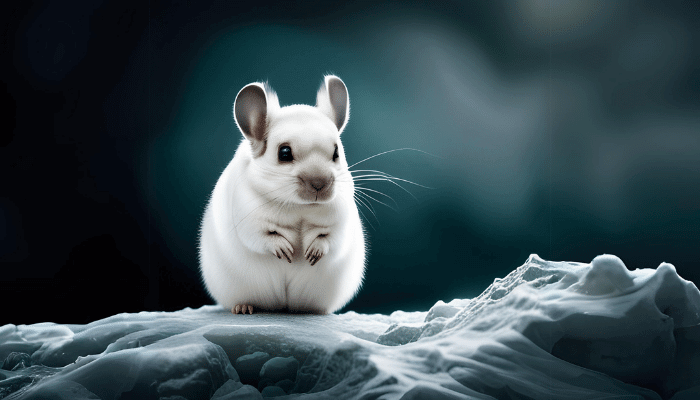
If you’ve confirmed that your chinchilla is indeed pregnant, there are several steps you should take to ensure a safe and healthy pregnancy.
Proper Nutrition:
Pregnant chinchillas need a diet rich in nutrients. Ensure they have access to fresh hay, high-quality chinchilla pellets, and a limited amount of fresh vegetables. Consult your veterinarian for specific dietary recommendations.
Isolation:
Consider isolating the pregnant chinchilla from any males, as they may become territorial and stressed during the pregnancy.
Regular Check-ups:
Schedule regular check-ups with an experienced exotic pet veterinarian to monitor the pregnancy and address any health concerns.
Preparing for Birth:
Chinchillas typically give birth in the evening or at night. Provide a nest box filled with soft bedding material to ensure a comfortable and safe birthing environment.
Caring for Newborns:
Once the chinchilla gives birth, be prepared to provide extra care for the newborns. They are born in a relatively undeveloped state and will require additional attention.
The Miracle of Chinchilla Birth
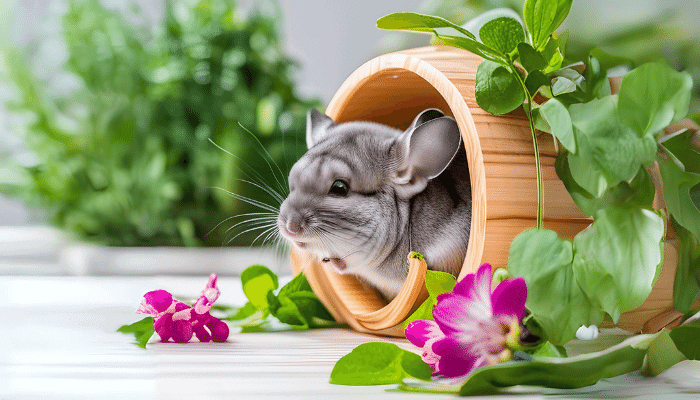
Chinchilla pregnancies are truly a miracle of nature. These small, furry creatures go through a lot to bring their offspring into the world. By understanding how to tell if a chinchilla is pregnant and providing the necessary care, you can be a responsible and caring chinchilla owner.
Caring for a Pregnant Chinchilla
Now that you know how to identify a pregnant chinchilla let’s explore the necessary care to ensure her pregnancy goes smoothly.
Diet and Nutrition:
Maintaining a proper diet during pregnancy is crucial for a chinchilla’s health. Follow these dietary guidelines:
- Chinchilla Pellets: High-quality chinchilla pellets should be the primary component of her diet.
- Fresh Hay: Offer unlimited fresh hay to ensure she has enough fiber.
- Leafy Greens: Incorporate a variety of safe, leafy greens as occasional treats.
- Water: Always provide fresh, clean water.
Stress Reduction:
Minimize stress factors in her environment, such as loud noises and excessive handling.
Post-Pregnancy Care:
After giving birth, the mother and babies will require special care. Here’s what you need to know:
- Maternal Care: Ensure the mother chinchilla is nurturing her babies. If she’s not, you may need to step in and provide assistance.
- Baby Chinchillas: The babies, called kits, are delicate and need a warm, secure environment. Make sure they have adequate warmth and ventilation.
- Weaning: Kits will start to wean at around 6-8 weeks. You can gradually introduce them to chinchilla pellets and hay.
- Socialization: As the kits grow, they can be gently socialized and handled. Ensure a safe and quiet environment for this.
Common Misconceptions About Chinchilla Pregnancies
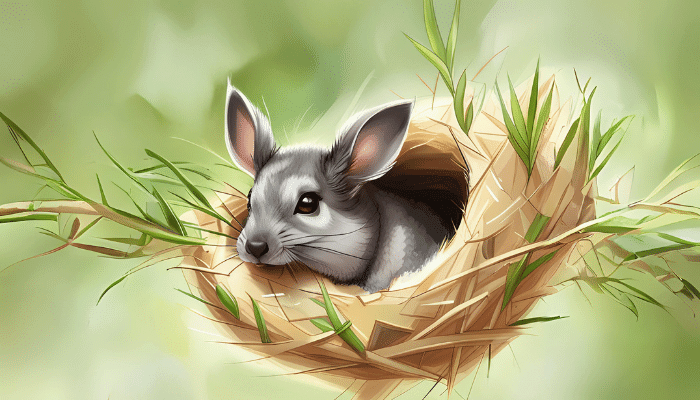
- Chinchillas Don’t Get Pregnant Easily: While chinchillas don’t have as many litters as some other small animals, they can get pregnant relatively easily, so it’s crucial to be vigilant.
- Chinchillas Can’t Breed Year-Round: Chinchillas are induced ovulators, meaning they can potentially breed year-round. It’s essential to keep them separate when you don’t want them to breed.
- Males Don’t Play a Role in Caring for the Young: Male chinchillas can help care for their offspring, although it’s primarily the mother’s responsibility.
- Chinchillas Always Need Human Intervention During Birth: In most cases, chinchillas give birth without any complications. Human intervention is only necessary in exceptional circumstances.
- All Chinchilla Breedings Are Successful: Not all chinchilla pregnancies result in healthy kits. Sometimes, there may be complications or stillborn offspring.
Conclusion
In this comprehensive guide, we’ve explored the signs and symptoms of a pregnant chinchilla, discussed common questions about chinchilla pregnancies, and provided guidance on how to handle this unique situation.
Remember that each chinchilla is different, and it’s essential to consult with a veterinarian for personalized care and advice. Caring for a pregnant chinchilla is a rewarding experience that allows you to witness the beauty of nature in the comfort of your home.
So, if you suspect your chinchilla may be pregnant, take the necessary steps to ensure a safe and healthy journey for both mother and babies.
FAQs About Chinchilla Pregnancy

How Many Kits Can a Chinchilla Have?
Chinchillas typically have one to three kits per pregnancy, although larger litters are possible. The number of kits can vary based on factors like genetics and the chinchilla’s age.
Can I Breed Chinchillas for Profit?
Breeding chinchillas should not be solely for profit, as it requires knowledge, effort, and resources. Overbreeding can lead to health issues and stress for the animals. Responsible breeding prioritizes the welfare of the chinchillas.
How Do I Prepare for a Chinchilla’s Pregnancy?
To prepare for a chinchilla’s pregnancy, provide a spacious and well-maintained enclosure, a balanced diet, and proper nesting materials. Regular veterinary check-ups and a calm, stress-free environment are also essential.
When Should I Separate a Male and Female Chinchilla?
If you don’t want your chinchillas to breed, it’s best to separate them before they reach sexual maturity, which is typically around 6 months of age.
Can I Handle a Pregnant Chinchilla?
Handling a pregnant chinchilla should be done with caution. Minimize stress and disturbances, especially in the later stages of pregnancy. If your chinchilla is accustomed to handling, keep it gentle and brief.
Can a chinchilla have a false pregnancy?
Yes, chinchillas can have false pregnancies, which can mimic the symptoms of a real pregnancy. To be certain, it’s best to consult a veterinarian for a professional assessment.
What should I feed a pregnant chinchilla?
A pregnant chinchilla should be provided with a well-balanced diet that includes high-quality chinchilla pellets, fresh hay, and limited treats. Ensure she has access to fresh water at all times.
Can male chinchillas get pregnant?
No, male chinchillas cannot get pregnant. Only female chinchillas can become pregnant.
At what age can chinchillas become pregnant?
Chinchillas can become pregnant as early as three to four months of age. However, it’s advisable to wait until they are at least eight months old to allow their bodies to mature fully.
Do pregnant chinchillas need special care?
Yes, pregnant chinchillas need additional care and a balanced diet to support their pregnancy. Consult with a veterinarian experienced in exotic pets for guidance.
